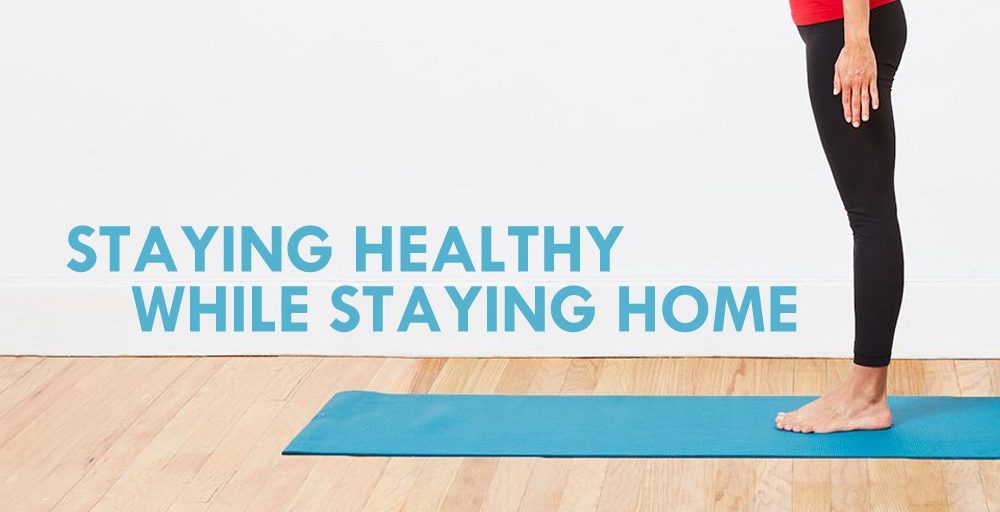Home > Blog > Health
Staying Healthy While Staying Home

More than a year into the pandemic, being in quarantine and following protocols have become our way of life. Our own homes have turned into a hub for all our main activities—work, school, and even buying goods, thanks to the internet. Limited movement is vital in preventing sickness, but the feelings of uncertainty, boredom, and powerlessness may affect mental health. However, maintaining our health and well-being is a must during these times.

Importance of health and wellness
More than ever, health and wellness must be prioritized as this serves as our shield against illnesses. According to UP (University of the Philippines Diliman) College of Human Kinetics Faculty Member Hercules Callanta, “The ability to fight off whatever viral load … is dependent on the immune system, where the immune system will fend off the attacks of a viral infection. Some people, even if [they] were exposed to someone in the same household who had a viral problem do not get sick or don’t even become positive because their immune system, which is the reflection of their health and wellness, was able to fend it off.”
With gyms and fitness centers still closed in NCR Plus due to the Modified Enhanced Community Quarantine (MECQ), some have turned to home-based workouts to stay healthy. This is a commendable thing since according to Callanta, exercise and the immune system are linked. “If you are fit and healthy, active and exercising well, researchers have shown that the immune system, due to the chronic effects of exercise, can become a lot stronger and more equipped to fend off infections.”
Maintaining our health and well-being during the pandemic
Callanta stressed that the World Health Organization (WHO) also recognizes the importance of exercise, not only for our physical health, but also for our mental and emotional well-being. He gives these tips:
- Eat right. Callanta advised following the Pinggang Pinoy. In this serving, half of the plate should be fruits and vegetables, while the other half should be composed of carbohydrates and protein. Carbohydrates include whole grains and whole wheat, while protein examples are fish, eggs, poultry and beef. “Proper food intake is a must since it’s a basic essential of our life,” said Callanta, adding that since there is no medication for COVID-19, we must rely on eating healthy foods to boost our immune system.
- Get enough rest and sleep. Though 7 to 8 hours of sleep is recommended, the quality of sleep is also important. Before going to bed, take time to relax the body and mind through gentle stretching and meditation. Make sleeping a habit by going to bed at the same time every night, and waking up roughly at the same time every morning.
- Manage stress. Stress is unavoidable, but can be managed through regular exercise. Other stress management techniques include remaining calm, talking to people, limiting news feeds and establishing routine.
- Engage in exercise and physical activity. “WHO says that 150 to 300 minutes of moderate to vigorous physical activity every single week has to be maintained.” Callanta recommended doing Short Incidental Physical Activities (SIPA)—functional exercises that can be done in small spaces easily available to us. “For every hour of uninterrupted sitting, we must stand up and do movements—not necessarily workouts but movements for 2 to 4 minutes,” said Callanta. This already contributes significantly to our health and wellness.
SIPA workouts
Those who work and study from home can benefit from SIPA. Callanta stated that this is “a way for us to maintain our health and fitness despite the quarantine and movement restrictions.” Examples of SIPA include:
- Squats
- Airwalk
- Arm and Leg raise
- Hinged stretch
- Twist
- Combination of twisting, bending and squats
- Step back lunges
- Marching
- Flying
- Knee touches
- Push ups
- Pull ups
Each exercise can be done for 2 to 4 minutes, which Callanta demonstrated through this video:
How exercise boosts mental health
According to the Department of Health, there are 3.6 million Filipinos suffering from mental disorders amidst the COVID-19 pandemic. The lack of mobility and distraction can cause us to overthink things. The lack of motivation may also push us to forego exercise, which Callanta advised against. “Through chronic exercise, our endocrine system secretes several hormones. Some of them are good hormones which allows us to feel good, serving as de-stressors.” There are also hormones that give us pain tolerance against factors that cause pain and stiffness.
Maintaining our health is an important responsibility with or without the pandemic, but it’s even more vital now because our life is at stake. Taking care of our overall health is our best investment, not only during the pandemic, but throughout the course of our lifetime.

